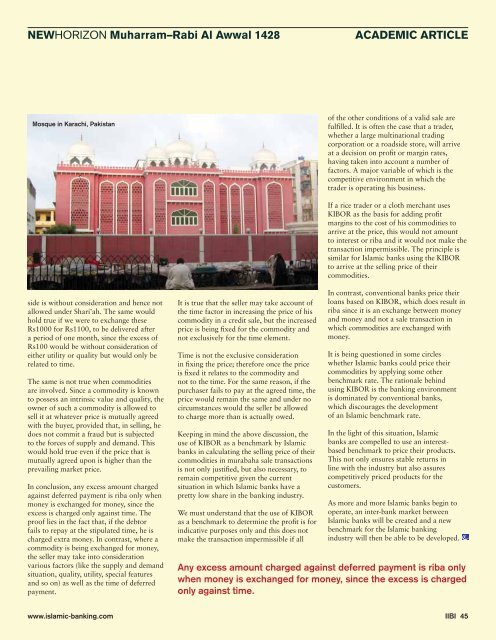issue no. 163 - january–march 2007 / muharram–rabi al awwal 1428
issue no. 163 - january–march 2007 / muharram–rabi al awwal 1428
issue no. 163 - january–march 2007 / muharram–rabi al awwal 1428
- No tags were found...
You also want an ePaper? Increase the reach of your titles
YUMPU automatically turns print PDFs into web optimized ePapers that Google loves.
NEWHORIZON Muharram–Rabi Al Aww<strong>al</strong> <strong>1428</strong><br />
ACADEMIC ARTICLE<br />
Mosque in Karachi, Pakistan<br />
of the other conditions of a v<strong>al</strong>id s<strong>al</strong>e are<br />
fulfilled. It is often the case that a trader,<br />
whether a large multination<strong>al</strong> trading<br />
corporation or a roadside store, will arrive<br />
at a decision on profit or margin rates,<br />
having taken into account a number of<br />
factors. A major variable of which is the<br />
competitive environment in which the<br />
trader is operating his business.<br />
If a rice trader or a cloth merchant uses<br />
KIBOR as the basis for adding profit<br />
margins to the cost of his commodities to<br />
arrive at the price, this would <strong>no</strong>t amount<br />
to interest or riba and it would <strong>no</strong>t make the<br />
transaction impermissible. The principle is<br />
similar for Islamic banks using the KIBOR<br />
to arrive at the selling price of their<br />
commodities.<br />
side is without consideration and hence <strong>no</strong>t<br />
<strong>al</strong>lowed under Shari’ah. The same would<br />
hold true if we were to exchange these<br />
Rs1000 for Rs1100, to be delivered after<br />
a period of one month, since the excess of<br />
Rs100 would be without consideration of<br />
either utility or qu<strong>al</strong>ity but would only be<br />
related to time.<br />
The same is <strong>no</strong>t true when commodities<br />
are involved. Since a commodity is k<strong>no</strong>wn<br />
to possess an intrinsic v<strong>al</strong>ue and qu<strong>al</strong>ity, the<br />
owner of such a commodity is <strong>al</strong>lowed to<br />
sell it at whatever price is mutu<strong>al</strong>ly agreed<br />
with the buyer, provided that, in selling, he<br />
does <strong>no</strong>t commit a fraud but is subjected<br />
to the forces of supply and demand. This<br />
would hold true even if the price that is<br />
mutu<strong>al</strong>ly agreed upon is higher than the<br />
prevailing market price.<br />
In conclusion, any excess amount charged<br />
against deferred payment is riba only when<br />
money is exchanged for money, since the<br />
excess is charged only against time. The<br />
proof lies in the fact that, if the debtor<br />
fails to repay at the stipulated time, he is<br />
charged extra money. In contrast, where a<br />
commodity is being exchanged for money,<br />
the seller may take into consideration<br />
various factors (like the supply and demand<br />
situation, qu<strong>al</strong>ity, utility, speci<strong>al</strong> features<br />
and so on) as well as the time of deferred<br />
payment.<br />
It is true that the seller may take account of<br />
the time factor in increasing the price of his<br />
commodity in a credit s<strong>al</strong>e, but the increased<br />
price is being fixed for the commodity and<br />
<strong>no</strong>t exclusively for the time element.<br />
Time is <strong>no</strong>t the exclusive consideration<br />
in fixing the price; therefore once the price<br />
is fixed it relates to the commodity and<br />
<strong>no</strong>t to the time. For the same reason, if the<br />
purchaser fails to pay at the agreed time, the<br />
price would remain the same and under <strong>no</strong><br />
circumstances would the seller be <strong>al</strong>lowed<br />
to charge more than is actu<strong>al</strong>ly owed.<br />
Keeping in mind the above discussion, the<br />
use of KIBOR as a benchmark by Islamic<br />
banks in c<strong>al</strong>culating the selling price of their<br />
commodities in murabaha s<strong>al</strong>e transactions<br />
is <strong>no</strong>t only justified, but <strong>al</strong>so necessary, to<br />
remain competitive given the current<br />
situation in which Islamic banks have a<br />
pretty low share in the banking industry.<br />
We must understand that the use of KIBOR<br />
as a benchmark to determine the profit is for<br />
indicative purposes only and this does <strong>no</strong>t<br />
make the transaction impermissible if <strong>al</strong>l<br />
In contrast, convention<strong>al</strong> banks price their<br />
loans based on KIBOR, which does result in<br />
riba since it is an exchange between money<br />
and money and <strong>no</strong>t a s<strong>al</strong>e transaction in<br />
which commodities are exchanged with<br />
money.<br />
It is being questioned in some circles<br />
whether Islamic banks could price their<br />
commodities by applying some other<br />
benchmark rate. The ration<strong>al</strong>e behind<br />
using KIBOR is the banking environment<br />
is dominated by convention<strong>al</strong> banks,<br />
which discourages the development<br />
of an Islamic benchmark rate.<br />
In the light of this situation, Islamic<br />
banks are compelled to use an interestbased<br />
benchmark to price their products.<br />
This <strong>no</strong>t only ensures stable returns in<br />
line with the industry but <strong>al</strong>so assures<br />
competitively priced products for the<br />
customers.<br />
As more and more Islamic banks begin to<br />
operate, an inter-bank market between<br />
Islamic banks will be created and a new<br />
benchmark for the Islamic banking<br />
industry will then be able to be developed.<br />
Any excess amount charged against deferred payment is riba only<br />
when money is exchanged for money, since the excess is charged<br />
only against time.<br />
www.islamic-banking.com IIBI 45
















